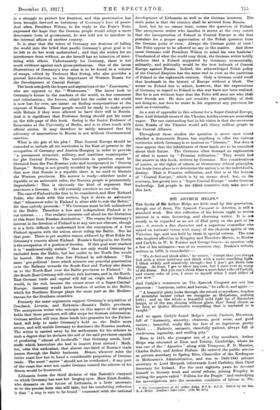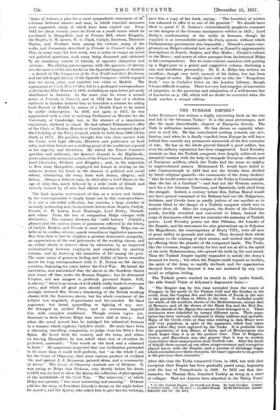SIR ARTHUR HELPS.•
THE books of Sir Arthur Helps are little read by this generation, though one of them, The Spanish Conquest in A meriecs, is still • standard work. But this collection of his letters ought to revive interest in a wise, foreseeing, and charming writer. It is naê merely to be regarded as an act of filial piety on the part of his son it reveals a fine character and a sagacious counsellor who mixed on intimate terms with many of the choicest spirits of the Victorian Age, and was held by them in special esteem. The man who inspired affection in Kingsley and Theodore Martin, in Ruakin and Carlyle, in W. E. Forster and George Grove—to mention only a few of his intimates—was of no common clay. Rix/dikes tribute, written in 1870, is remarkable :— " We do feel and think alike," he writes, " exoept that you always feel with a wiser intricacy and think with a more searching light I think widely and massively enough—but I don't get down into things At least, I got to their tap-root, hut I miss ever so many of the fibres. But you can't think what a mere faint echo of Carlyle, and coarse echo of you, I seem to myself when I road either of you now."
And Carlyle's comments on The Spanish COMIWISE are not lees generous : "luminous, naive, and human," he calls it, and again "A beautiful piety looks through the record everywhere, touches of mournful banter (what we recognise as Helpsisme, nothing loth) ; and on the whole a beautiful mild light (as of Sinurnbra lamps, or of the sun shining without glare, thee' fleetly clouds as he does at Quito) illuminates everything that is narrated or Is taught."
And so again Carlyle found Helps's novel, Casimir, Meremete, full of "humanity, sincerity, clearness, good sense, and good nature ; beautiful, really like the face of an ingenuous pretty Child. . . . Pathetic, sarcastic, cheerfully patient, always full of tenderness, ingenuity, and smiling pity."
Born in 1813, the youngest son of a City merchant, Arthur Helps was educated at Eton and Trinity. Cambridge, where he was one of the " Apostles " along with Tennyson, F. D. Maurioe, Charles Buller, and Arthur Hallam. He entered the public service as private selsreiary to Spring Rice, Chancellor of the Exchequer in Melbourne's Administration, and was in 1840-1841 private secretary to Lord Morpeth (afterwards Lord Carlisle), then Chief Secretary for Ireland. For the next eighteen years be devoted himself to literary work sad social reform, joining Kingsley in writing the papers called "Politics for the People" and embodying his investigations into the economic condition of labour in The • The Cornreponelenee of Sir. Arthur Adju, 'C.O.D., D.C.L. Edited by Ws Bea. E. A. Heirs. Loudon Jot. ;see. Ink ee. aeLli !Wain,. of Labour, a plea for a more sympathetic treatment of the relations between master and man, in which remedial measures wore suggested, many of which have been carried out. From [843 for about twenty years he lived on a small estate which he purchased in Hampshire, and at Vernon Hill, where Kingsley, the Doyles, 0. H. Lewes, W. G. Clark, Carlyle, Emerson, Theodore Martin, and Woolner were among his visitors, many of the walks and discussions described in Friends in Council took place This, in some ways his best work, was a series of essays on social end political questions, each essay being discussed and criticized Pry an imaginary coterie of friends, of opposite characters and opinions. His abiding preoccupation with the question of slavery was the motive of his two books on the Spanish Conquest of America —a sketch of The Conqueror. of the New World and their Bomitnnen and the full-lengtb history of the Spanish Conquest—which engaged him for seven years and entailed two visits to Madrid. The appearance of Uncle Tones Cribb, led to a prolonged correspondence with Charles Eliot Norton in 1851, including an open letter privately distributed in America. hi the same year he wrote a second aeries of Friends in Council, and in 1853 the fear, of a cholera epidemic in London induced him to formulate a scheme for aiding local Boards of Health by means of a Health Fund to be raised by public subscription. In 1856, and again in 1857, he was approached with a view to entering Parliament as Member for the University of Cambridge, but, in the absence of a unanimous requisition, declined to stand. He had refused Palmerston's offer of the Chair of Modern History at Cambridge, but accepted that of the Clerkship of the Privy Council, which he held from 1860 till his death in 1873. His position brought him into close contact with the Court, with high officials, Ministers and politicians on both sides, and these letters are a striking proof of the confidence reposed in Ids sagacity and discretion. He edited the Prince Consort's speeches and addresses, the Queen's Journal in the Highlands; wrote admirable memorial notices of the Prince Consort, Palmerston, Lord Clarendon, Dickens and Kingsley ; and, on his migration to Kew from Hampshire, employed his leisure in writing on the subjects nearest his heart in the domain of political and social reform, alternating the essay form with drama, allegory, and fiction. Always a delicate man, be died after a brief illness at the age of sixty-two, much beloved by a wide circle of friends and entirely tiusted by all who had official relations with him.
The high opinion entertained of him as a writer and thinker by his contemporaries is amply borne out in this correspondence. It is not a one-sided collection, but contains a largo number of intensely interesting and characteristic letters from Ruskin, Carlyle, Fronde, G. H. Lewes, Lord Monteagle, Lord Derby, Disraeli, and others. From the test of comparison Helps emerges with distinction. The rout rest between his " mild lucency" (Carlyle'a phrase) and the various forms of Pessimism reflected in the letters of Carlyle, Ruskin, and Fronde is most refreshing. Helps was no believer in sudden reforms, quack remedies,or legislative panaceas But from first to last he displays a genuine democratic sympathy; an appreciation Of the real grievances of the working classes, and an ardent desire to remove them by education, by an improved understanding between employers and employed, by sanitary reforms, and by fostering the amenities of life among the poor Flue same union of generous feeling and dislike of heroic remedies marks his long correspondence with C. E. Norton on the slavery epiestion, beginning ten years before the Civil War. He hated the institution, and maintained that the slaves in the Southern States were worse off than sunder the Roman Empire ; but he distrusted Utopias, and saw dangers in perfectly governed States. Still, in slavery" there is an excess of evil which really tends to overcome piety, and which all good men should combine against." He strongly resented Mr. Stowe's bracketing of the British working classes with the American slaves, but his whole treatment of the subject was singularly dispassionate and fair-minded. He liked argument, but hated quarrelling or fighting of any sort, He belonged to neither Party, and no statesman inspirnd him with complete confidence. Though serious topics pre. dominate in these letters, Helps was never dull or heavy. And when the mood moved him lie indulged his whimsical humour in a manner which explains Carlyle's simile. He must have been a charming travelling companion, to judge from his lette.s from Spain. He loved both the country and the town, and when, en leaving Hampshire, he was asked what sort of situation he preferred, answered': "Vast woods at the back and a cabstand in front." He sometimes suspected that our civilization pretended to do more than it could well perform, but "en the whole I am for the Court of Chancery, that most curions product of civilized fife, and against J. J. Rousseau, painted skim, and a community of wives." The Court of Chancery reminds one of Dickens. It was owing to Helps that Dickens, very shortly before his death in1870, was invited to show the Queen his collection of photographs of the battlefields of the Civil War. " The interview," at which Helps was present, "was most interesting and amusing." Dickens sold her the story of President Lincoln's dream on the night before his murder, and the Queen, who asked him to give her his writings, gave him a copy of her book, saying "The humblest of writers was ashamed to offer it to one of the greatest." We should have liked to quote C. E. Norton's extraordinarily prophetic comment on the dangers of the German immigration written in 1851! Lord Derby's condemnation of the traffic in honours, thong% he regarded it as irremediable under the Party system, without which Parliamentary government was impossible; Disraeli's ornate com- pliments on Helps's editorial tact as well as D;sraeli's epigrammatic descriptions of Jowett, Ruskin, and Max Mailer; Froude's tribute to the Boors; and scores of other passages from thelettersof Helps or his correspondents. But we must content ourselves with putting up a finger-post to a genial and suggestive volume, disclosing a rare and beneficent personality. Mr. E. A. Helps has written an excellent, though very brief, memoir of his father, but has been too frugal of notes. He might have told us who the "Neapolitan duck" was in Carlyle's letter on the London Library, though it is not difficult to guess. There is a very bad misprint, or succession of misprints, in the quotation and adaptation of a well.known line of Lucretius on p. 100, which will no doubt be corrected when the book reaches a second edition.



































 Previous page
Previous page